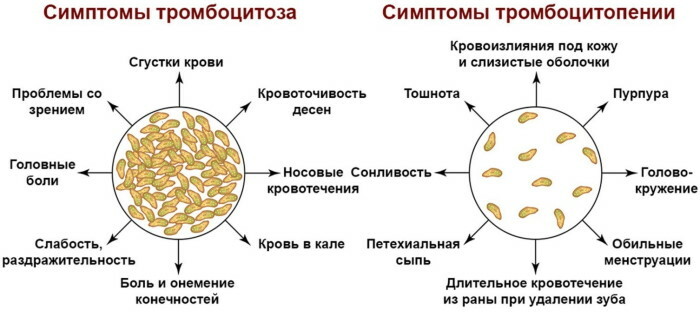Content
- Compound
- How is synthesized
- Usage rate
- Effects on the body
- Provides a sense of personal satisfaction
- Develops a sense of affection
- Boosts cognitive function
- Decreased sensitivity to drugs
- Effects on the cardiovascular system
- Effects on the kidneys
- Effect on the adrenal cortex
- Impact on digestive function
- Beneficial features
- Harmful properties
- Side effects
- Dopamine Synthesis Products
- Dopamine video
Dopamine is a hormonal substance from the group of neurotransmitters, which is found in the tissues of the brain of humans and most vertebrates. This chemical compound affects the psycho-emotional state of a person, his actions, internal perception of the world around him and loved ones.
Dopamine excreted from the human body looks like a solid crystal-like substance with a specific odor. The hormone dissolves well in water. This figure corresponds to 60 g per 100 ml of liquid. The melting point of dopamine is about 128 ° C. The chemical formula of this substance is as follows: С8Н11NO2. The physiological synthesis of dopamine is impossible without the vital amino acid L-tyrosine.
Compound
Dopamine of a synthetic origin, which is used for therapeutic purposes, consists of the biologically active substance dopamine hydrochloride. 1 ml of intravenous solution contains 5, 10, 20 or 40 mg of the hormone.
The following chemicals perform an auxiliary function:
- hydrochloric acid in a dosage of 0.1 M, adapted to a pH level of 3.5 to 5.0 units;
- sterile water for injection with a mass fraction of up to 1 ml;
- sodium disulfite in an amount of 1 mg.
The dopamine hormone, which is synthesized in the human body, has the following chemical composition:
- 8 carbon atoms;
- 11 hydrogen atoms;
- 1 nitrogen atom;
- 2 oxygen atoms.

Depending on the physical and psycho-emotional state of human health, a hormone can be formed on the basis of dopamine norepinephrine, as well as other biochemical substances that are responsible for the functions of the central and peripheral nervous system. In most cases, changes in the chemical formula of dopamine cause sudden stressful situations, shock, and severe mental turmoil.
How is synthesized
Dopamine is a hormone found in the cerebral cortex. The formation of this substance is a complex biochemical process. The table below details all the steps in dopamine synthesis.
| Stages of hormone formation | Description of the biochemical process |
| Stage 1. Receipt of the raw material base in the form of phenylalanine. | Phenylpropionic acid enters the human body along with food of protein origin. It is an aromatic type alpha amino acid whose chemical model resembles the amino acid compound alanine. |
| Stage 2. Biochemical modification of phenylpropionic acid. | During metabolic transformations, the amino acid L-tyrosine is synthesized on the basis of phenylpropionic acid. This substance has minimal differences from phenylalanine. The chemical formula of L-tyrosine is supplemented only by phenolic compounds in the structure of the hydroxyl group. |
| Stage 3. Enzymatic cleavage of the amino acid L-tyrosine. | The amino acid L-tyrosine undergoes a complex process of enzymatic hydroxylation, as a result of which the biologically active substance L-DOPA is formed. It is a versatile amino acid intermediate. Based on this chemical compound, the human body is able to synthesize the hormones dopamine, melanin, adrenaline, and norepinephrine. |
| Stage 4. Conversion of the chemical compound L-DOPA. | The biologically active substance L-DOPA is exposed to an enzyme called L-DOPA decarboxylase. The result of this chemical reaction is the formation of the hormone dopamine. |
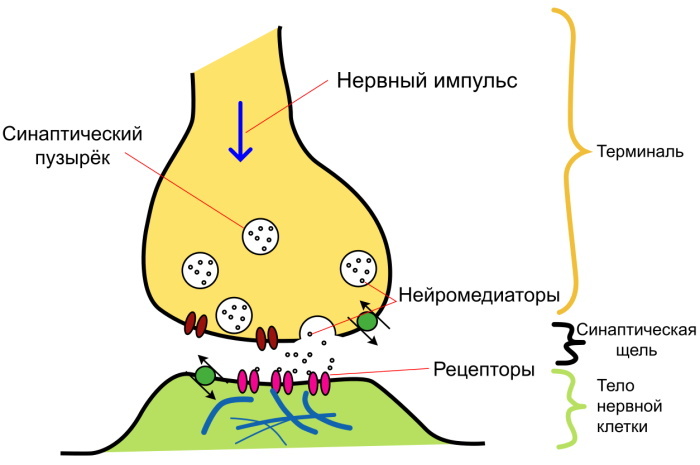
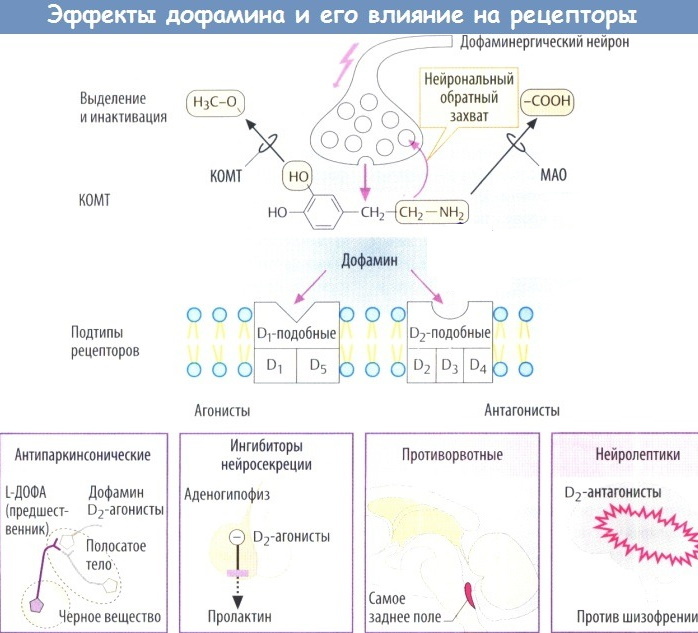 The above process of biochemical synthesis of dopamine occurs in the cytoplasmic fluid of neurons in the brain. Vacuoles and cell nuclei are not involved in the formation of this hormone. The chemical reaction takes place within the boundaries of the plasma membrane of neurons. D1, D2, D3, D4, D5 - dopamine receptors are responsible for the physiological identification of molecules of this hormone.
The above process of biochemical synthesis of dopamine occurs in the cytoplasmic fluid of neurons in the brain. Vacuoles and cell nuclei are not involved in the formation of this hormone. The chemical reaction takes place within the boundaries of the plasma membrane of neurons. D1, D2, D3, D4, D5 - dopamine receptors are responsible for the physiological identification of molecules of this hormone.
Usage rate
Dopamine hormone is found in the centers of the brain, and the increase or decrease in the volume of its synthesis depends on the general state of human health, as well as environmental conditions. In which he spends most of his time. The normal concentration of dopamine in the body of a child, adult man or woman is from 5.6 to 44 picograms per 1 milliliter of the test fluid.
The patient's daily urine or 5 ml of his venous blood is used as a biological material for laboratory diagnostics. The study is carried out using the method of liquid chromatography. Determining the level of dopamine requires adherence to a whole list of rules for preparing the body.
The norms of consumption of dopamine of a synthetic nature of origin are determined on an individual basis, depending on the patient's diagnosis. A low daily dose of this hormone is considered to be from 100 to 250 μg per minute. Dopamine hydrochloride medicinal solution is administered intravenously using a dropper. A similar dosage is used to enhance the functional activity of the patient's kidneys, as well as to increase the frequency of contractions of the heart myocardium.
The area of average consumption of dopamine is from 300 to 700 mcg per minute. These doses are indicated for patients undergoing a multi-stage course of surgical therapy. The maximum intake of synthetic dopamine is 750 to 1500 mcg per minute. A similar dosage is used to treat patients in a state of septic or anaphylactic shock.
Effects on the body
Dopamine is a hormone found in vesicles. These are special synaptic vesicles located in the tissues of the brain. Dopamine is a potent neurotransmitter that affects the function of all internal organs and life support systems.
Provides a sense of personal satisfaction
According to laboratory data, dopamine acts as a chemical factor in the physiological systems of "reward" of the brain in response to overcoming stressful situations or achieving the set goals. The release of an additional amount of this hormone into the cytoplasmic fluid of neurons and the bloodstream causes a pronounced feeling of pleasure. At such moments, a high concentration of dopamine has a significant effect on a person's internal attitude to life circumstances that preceded the active phase of hormone synthesis.
Dopamine increases the level of motivation to achieve new heights and set goals, causes a thirst for new knowledge. There is a second theory of the emergence of a sense of personal satisfaction caused by the influence of the hormone. Some scientists believe that dopamine does not contribute to the feeling of pleasure, but stimulates the emotion in the form of anticipation. For example, before eating delicious food, having sex, or going on a long-awaited trip. Dopamine is synthesized in large quantities in people who already have subjective ideas about positive life events.
Develops a sense of affection
Dopamine plays an important biochemical role in the formation of feelings of affection and love for loved ones. This is especially true of the relationship between children and parents. A scientific experiment was devoted to this effect of dopamine on the organism of living beings. The objects of study were the gray vole mice belonging to the species group Microtus ochrogaster.
These rodents are characterized by the construction of exclusively monogamous relationships. The results of the study found that the D2 receptors of these mice are responsible for the perception of dopamine in as a chemical stimulant that induces attachment to a sexual partner and a sense of marital loyalty. Scientists have come to the conclusion that this hormone acts in a similar way on the human body.
Boosts cognitive function
Dopamine takes an active part in ensuring the human mental function. A sufficient level of this hormone in the tissues of the brain is necessary for the central nervous system to be able to quickly switch attention from one object to other objects or external stimuli of the environment Wednesday. Dopamine has a similar effect on people who are engaged in several activities for a short period of time.
At the same time, the lack of dopaminergic impulses leads to a pronounced inertness of the human central nervous system. There is a slowdown in cognitive processes in the brain. A person observes bradifrenia, distraction of attention, lack of collection of thoughts.
Parkinson's disease is a typical example of acute dopamine deficiency in neurons. In 2007, neuroscientists from Germany, as a result of a scientific experiment, were able to prove that people with high or the optimal level of this hormone have the ability to learn from past mistakes in life. Men and women with low dopamine levels ignore the effects of negative experiences.
Decreased sensitivity to drugs
Dopamine hormone is found in the body of all children and adults who do not have severe mental and neurological diseases. Periodic or regular intake of narcotic substances stimulates the brain cells to synthesize additional amounts of this hormone. In people taking psychostimulants, the level of dopamine in the central nervous system exceeds the normal level by 5-10 times. A person who uses drugs feels happy, feels inner satisfaction and joy.
Under the influence of narcotic substances, the sensitivity of the receptors responsible for the identification of dopamine decreases. The cells of the brain cease to independently synthesize a sufficient amount of this hormone, replacing its properties with the influence of psychostimulants.
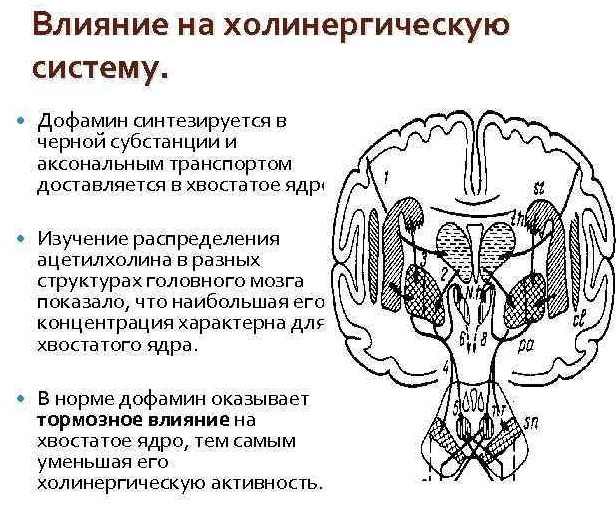
A person with pathological addiction is forced to constantly increase the next dose of a narcotic substance in order to make up for the deficiency of lost dopamine, and also to experience the previous pleasure again. Further progression of chemical tolerance to drugs leads to severe damage to the brain and internal organs. Most of the changes in the central and peripheral nervous system are irreversible.
Effects on the cardiovascular system
Dopamine provokes more active resistance in peripheral blood vessels. The release of large amounts of this hormone leads to an increase in upper blood pressure. The biochemical process of stimulation of alpha-adrenergic receptors is started. Dopamine increases the frequency and strength of heart muscle contractions, but it is softer than adrenaline. Under the influence of this hormone, the physiological demand of the myocardium for an additional amount of oxygen increases, which is completely satisfied by increasing blood flow in the coronary vessels.
Effects on the kidneys
During the binding of dopamine to receptors sensitive to it, the natural resistance of the renal vessels decreases. The hormone increases local blood flow in these organs of the excretory system, and also activates renal filtration. In combination with this effect, an increase in natriuresis is observed. Large doses of dopamine that enter the bloodstream over a short period of time have the opposite effect. In this case, a person has a narrowing of the blood vessels of the kidneys.
Effect on the adrenal cortex
Dopamine has the biochemical property of suppressing the production of aldosterone, the synthesis of which occurs in the adrenal cortex. The process of inhibition of renin secretion is started. At the same time, the kidney tissue increases the production of prostaglandins.
Impact on digestive function
Dopamine has the following effects on the functions of the digestive system:
- slows down the peristalsis of the stomach;
- relaxes the smooth muscles of the lower esophageal sphincter;
- activates the chemoreceptors of the central nervous system, which coordinate the functions of the gastrointestinal tract;
- stimulates esophageal and gastric reflux;
- is directly involved in the implementation of the gag reflex (for example, during the poisoning of the body, intoxication of the digestive system with the products of the vital activity of microbes).
Provided that the normal concentration of dopamine in the blood is maintained, a person does not feel the pronounced effect of this hormone on the functions of the gastrointestinal tract. Exceeding the permissible levels of this substance in the cerebral cortex can cause digestive disorders.
Beneficial features
Dopamine is essential for maintaining the stable functioning of all internal organs and life support systems of the human body.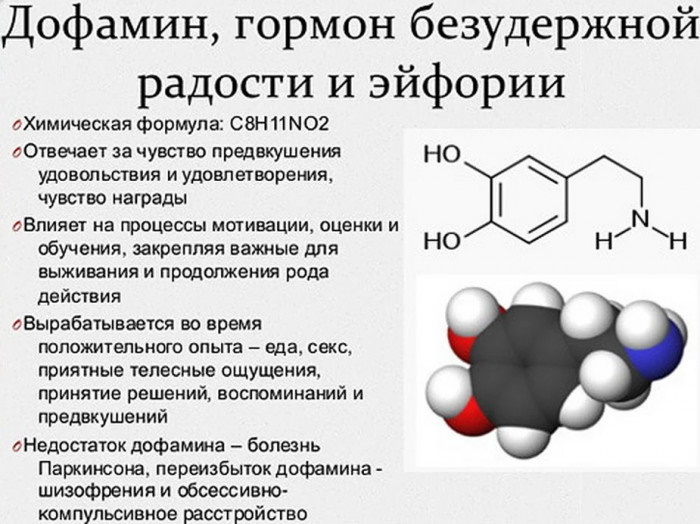
This hormone has the following beneficial properties:
- evokes a feeling of love and affection for loved ones;
- accelerates the processes of adaptation of the body in conditions of prolonged stress (for example, in a combat zone, during man-made disasters, natural disasters);
- helps to maintain composure during the growing fear, not allowing panic attacks to exert excessive pressure on the mind;
- maintains the monogamy of relations between sexual partners;
- improves cognitive functions of the brain in terms of organizing a more active thought process;
- takes part in the emergency evacuation of stomach contents in case of poisoning of the body with biological poisons, chemical toxins, intestinal infection;
- evokes a feeling of joy, happiness and inner satisfaction with certain life circumstances, events;
- improves blood circulation in the tissues of the kidneys and coronary vessels;
- reduces the sensitivity of peripheral nerve receptors in people who have suffered severe trauma, burns of large areas of the body, recovering from complex surgical operations, septic shock;
- increases the functional activity of the heart muscle and at the same time reduces the resistance of the walls of blood vessels;
- affects the motivational mood of a person (due to the influence of this hormone, people set ambitious goals for themselves, feeling joy and anticipation on the eve of their achievement);
- activates analytical thinking in terms of extracting key mistakes from unsuccessful life experiences of past years;
- maintains a stable psycho-emotional state, preventing the sudden onset of sudden mood swings;
- strengthens the desire to acquire knowledge, learn and master new skills.
A person with a physiologically normal level of dopamine in the blood leads a normal life. Deficiency or excessive synthesis of this hormone leads to the development of disorders in the work of the psyche, causes painful condition of internal organs, becomes the cause of behavioral disorders and pathological dependencies.
Harmful properties
Dopamine, which is in the human body in optimal physiological values, does not have a negative effect.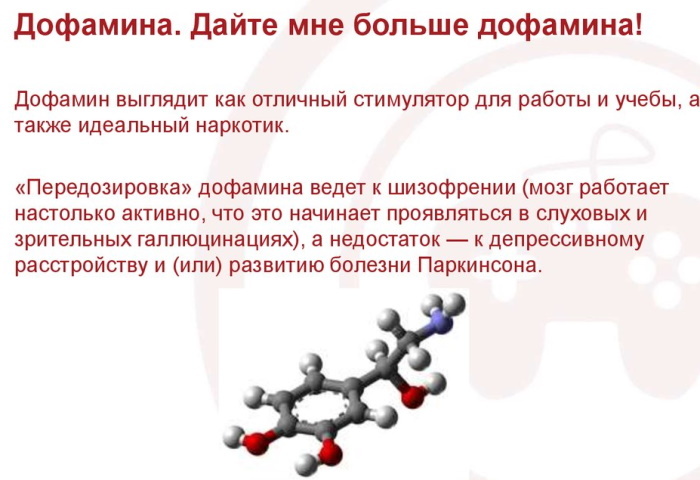
Violation of the norm of this hormone entails the implementation of its following harmful properties:
- the development of Parkinson's disease (with dopamine deficiency);
- manifestation of symptoms of schizophrenia;
- panic attacks;
- creating an additional load on the myocardial tissue;
- an increase in the heart's need for additional oxygen;
- the emergence of an individual tendency to drug, alcohol, nicotine addiction;
- pathological addiction to gambling;
- apathy, depression and complete indifference to what is happening in the environment;
- disruption of the kidneys and organs of the digestive tract;
- very frequent urination, during which the body is actively losing sodium ions (possibly a violation of the water-electrolyte balance).
People with dysfunction of certain dopaminergic regions of the brain may experience delusional ideas, confusion, visual and auditory hallucinations, signs of psychomotor excitement.
Side effects
The side effects caused by dopamine are only possible in people taking this hormone in the form of intravenous injections. For example, during the period of drug treatment.
In this case, the manifestation of the following symptoms is not excluded:
- heart rhythm disturbance from tachycardia to bradycardia;
- increased blood pressure;
- nausea;
- anxiety state;
- frequent vomiting;
- attacks of bronchial asthma;
- severe shortness of breath;
- anaphylactic shock;
- polyuria;
- necrotic lesions of the skin and subcutaneous tissue;
- attacks of severe headache;
- azotemia;
- arrhythmia of the ventricular type;
- compressive pain in the retrosternal space.

The appearance of the above symptoms of side effects of drugs based on dopamine is the basis for stopping further treatment with a synthetic analogue of this hormone. Patients with similar body reactions receive symptomatic therapy.
Dopamine Synthesis Products
In its pure form, this hormone is not found in products of plant and animal origin. The production of dopamine occurs only in the neurons of the human brain.
The following foods are distinguished, which contribute to the more active synthesis of this hormone:
- ocean fish and other seafood;
- avocado;
- oatmeal;
- all types of legumes;
- nuts;
- greens;
- fermented milk products;
- bananas;
- meat.
To maintain a stable level of dopamine within the normal range, it is necessary to provide your body with balanced diet, as well as lead a measured lifestyle, excluding physical and psycho-emotional overvoltage.
Dopamine is a hormone found in the tissues of the human brain. The synthesis of this substance is carried out by neurons, and its accumulation is carried out by synaptic vesicles (vesicles). Dopamine is responsible for feelings of joy, happiness, life satisfaction. The active synthesis of this hormone is observed in people at the time of anticipation of potentially joyful events.
Dopamine is essential for stable memory, thought, and concentration. Scientific research in the field of neuroscience has proven that this hormone is necessary for the formation of feelings of attachment and love for loved ones. A decrease in dopamine in the cerebral cortex leads to apathy, depression, destructive changes in the central nervous system, signs of aggressive behavior appear.
Dopamine video
Dopamine is the hormone of joy. How to fill the deficit:


